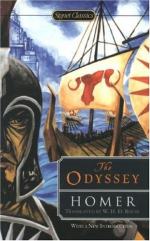On such wise they spake one to another. And Melanthius drew near them, the goatherd, leading the goats that were most excellent in all the herds to be a dinner for the wooers, and two shepherds bare him company. So he tethered the goats beneath the echoing gallery, and himself spake to Odysseus and taunted him, saying:
’Stranger, wilt thou still be a plague to us here in the hall, with thy begging of men, and wilt not get thee gone? In no wise do I think we twain will be sundered, till we taste each the other’s fists, for thy begging is out of all order. Also there are elsewhere other feasts of the Achaeans.’
So he spake, but Odysseus of many counsels answered him not a word, but in silence he shook his head, brooding evil in the deep of his heart.
Moreover a third man came up, Philoetius, a master of men, leading a barren heifer for the wooers and fatted goats. Now ferrymen had brought them over from the mainland, boatmen who send even other folks on their way, whosoever comes to them. The cattle he tethered carefully beneath the echoing gallery, and himself drew close to the swineherd, and began to question him:
’Swineherd, who is this stranger but newly come to our house? From what men does he claim his birth? Where are his kin and his native fields? Hapless is he, yet in fashion he is like a royal lord; but the gods mar the goodliness of wandering men, when even for kings they have woven the web of trouble.’
So he spake, and came close to him offering his right hand in welcome, and uttering his voice spake to him winged words:
’Father and stranger, hail! may happiness be thine in the time to come; but as now, thou art fast holden in many sorrows! Father Zeus, none other god is more baneful than thou; thou hast no compassion on men, that are of thine own begetting, but makest them to have fellowship with evil and with bitter pains. The sweat brake out on me when I beheld him, and mine eyes stand full of tears for memory of Odysseus, for he too, methinks, is clad in such vile raiment as this, and is wandering among men, if haply he yet lives and sees the sunlight. But if he be dead already and in the house of Hades, then woe is me for the noble Odysseus, who set me over his cattle while I was but a lad in the land of the Cephallenians. And now these wax numberless; in no better wise could the breed of broad-browed cattle of any mortal increase, even as the ears of corn. But strangers command me to be ever driving these for themselves to devour, and they care nothing for the heir in the house, nor tremble at the vengeance of the gods, for they are eager even now to divide among themselves the possessions of our lord who is long afar. Now my heart within my breast often revolves this thing. Truly it were an evil deed, while a son of the master is yet alive, to get me away to the land of strangers, and go off, with cattle and all, to alien men. But this is more grievous still, to abide here in affliction watching over the herds of other men. Yea, long ago I would have fled and gone forth to some other of the proud kings, for things are now past sufferance; but still my thought is of that hapless one, if he might come I know not whence, and make a scattering of the wooers in the halls.’




